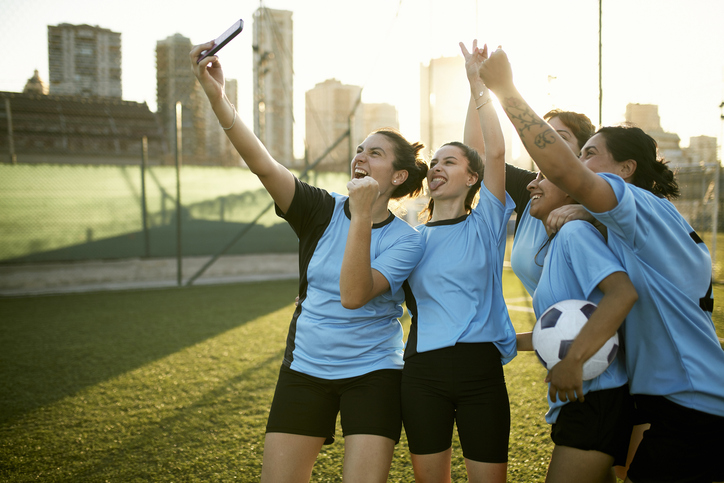Athletes, coaches and staff
Social media can be a valuable tool for athletes, coaches and staff to develop a personal brand, harness the power of fans/followers, and share their journey through stories and experiences. It is important that individuals consider the following:
- Align your online behaviour to your values.
- Before you post, ask yourself: “What is the purpose of the post? How does it align with my personal brand? What will it achieve?” Consider the “80/20 rule” – 80% professional and 20% personal (not necessarily private) posts. Fun posts that connect you to your audience. So for example, it might be about baking, gardening, parenting or pets. It helps when athletes come across as human beings!
- THINK – Is it True, Helpful, Inspiring, Necessary and Kind?
- Seek permission before mentioning someone in a post, especially children.
- Ensure that content published is factually accurate, good quality information and authentic.
- Make it clear that the stated views are your own and not the NSOs.
- Be polite and respectful to all people you interact with and presume “positive intent” – where the tone or perspective might be unclear, avoid jumping to conclusions and replying in a reactive way.
- Determine the line you want to draw between your professional/public life and your private/personal one, have an understanding about the impact of revealing personal information to the public (especially in relation to location, dating and children).
- Be mindful and notice how the activities you engage with online shape your mood and cognition, and the way this may then impact your training and/or performance.
- Give yourself some downtime from social media prior to bed to allow your brain time to wind down and log off before falling asleep.
- Manage your notifications – don’t let them rule you!
- Be wary of your actions online after consuming alcohol, and the impact that drinking may have on your sense of what is appropriate to post.
Social media can also negatively impact the reputation of athletes, coaches and staff. Consider avoiding the following on social media platforms:
- Use proper complaints procedures or channels for genuine concerns instead of commenting on disputes and grievances publicly.
- Avoid commenting on internal meetings and events (such as team selection and injuries).
- Refrain from making promises regarding your NSO’s operations or decisions.
- Never share intimate images of other people without consent.
- Avoid becoming involved in online debates with other people you suspect are being inappropriate.
- Refrain from making excessive comments or posts on a particular issue.
- Avoid making comments in the heat of the moment and/or in a reactive state of mind.
- Avoid posting content that could be considered harmful.
Further guidance for HP Staff
The AIS understands that in today’s fast-paced and ever-changing digital age, sometimes the best way to communicate to athletes is often via social media platforms.
Please consider the following before liaising and/or creating any chat rooms, blogs, group or event pages:
- Ensure your athletes are only using those social media platforms where they meet the minimum legal age requirements for those platforms, as per the Terms of Service for each platform they are using.
- All NSOs must clearly communicate what is, and what is not, appropriate between athletes and coaches with respect to social media communication. There is no set rule as to whether, for example, a coach should be able to text athletes directly or be ‘friends’ with athletes on Facebook. The important matter is that the NSO has considered it, formed a view, and applies it.
- Where the athlete is a minor, emails, texts or other messages sent to them should be copied to their parent or guardian where it is practical to do so. Coaches and staff should refrain from ‘friend requests’ or ‘follow’, etc, on Social Media forums (other than designated coaching or sports admin forums).
- If creating a group page and or group chat, you should invite the whole team, don’t exclude individuals. Correspondence should be limited to disseminating training/competition information for example.
- Selection communication should not be posted on any social media platform, unless prior contact has been made to those individuals either selected, not selected or de-selected prior to publishing.
- Check with your manager or human resources department about applicable compliance or workplace health and safety issues, as the group pages are likely to fall within the NSO's 'workplace' for the employees in the group.
National Sporting Organisations (NSO)
Some of the ways social media can help NSO’s include allowing the NSO to:
represent your sport’s brand and values
promote the sport
attract fans, get feedback and build loyalty
increase your market reach
share with your online community of followers
communicate with stakeholders
exchange ideas to improve the way you operate
recruit skilled staff or volunteers, or garner interest in an event
deliver on sponsorship commitments
increase traffic to your website
keep an eye on your competitors
NSO considerations prior to using social media include:
- You are unprepared and operate your social media presence without planning or a strategy, you could waste valuable time and money.
- If you don’t have a clear marketing or social media strategy, the benefits may be reduced. Additional resources to manage your online presence may be required.
- Social media is immediate and needs daily monitoring. If a social media presence is not actively managed, there is unlikely to be any real benefits.
- An NSO may receive unwanted or inappropriate behaviour on your site, including bullying and harassment. Social media exposure could attract risks such as negative feedback, information leaks or hacking, or legal risks such as liability in defamation.
